A Journey with An Innovative Chef to Meet Producers of Tanba Ingredients
Tanba, in Hyogo Prefecture, boasts castle towns offering culinary delights like ‘Tanba Kuro’ black soybeans & ‘Tajima’ beef.
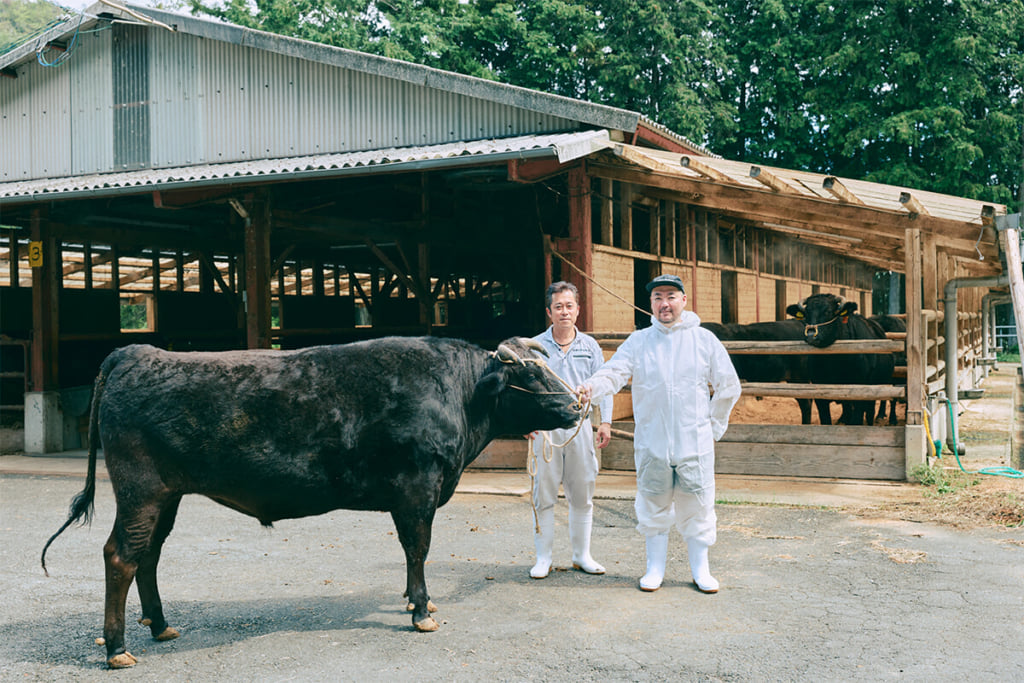
The Tanba area, located in the northeastern part of Hyogo Prefecture, consisting of the castle towns of Tanba Sasayama and Tanba, flourished as a key transportation hub to Kyoto and is a treasure trove of cuisine that impresses food enthusiasts with delicacies like Tanba Kuro (black soybeans) and Tajima beef. To discover yet-to-be-explored ingredients, Chef Yusuke Takada embarked on a journey to explore the terroir of Hyogo.
Tanba Sasayama’s unique legacy: ancestral skills passed to the next generation
The renowned Tanba Kuro soybeans are a staple of traditional New Year’s cuisine. Among them, Tanba Kuro edamame, which can only be harvested for about one month, is said to be a rare delicacy as it is not distributed nationwide. ‘Tanba Kuro soybeans require the most effort in the world,’ says with a smile Yasuhisa Tabuchi of Tabuchi Farm. ‘The basin of Sasayama here used to be a swamp with fertile and clayey soil since ancient times. With significant temperature differences between day and night, the taste becomes richer. However, black beans prefer dry land, so cultivation by hand is necessary to improve drainage. The height of the ridges is over 50 cm, and the distance between the ridges is over 160 cm, requiring manual labor.’
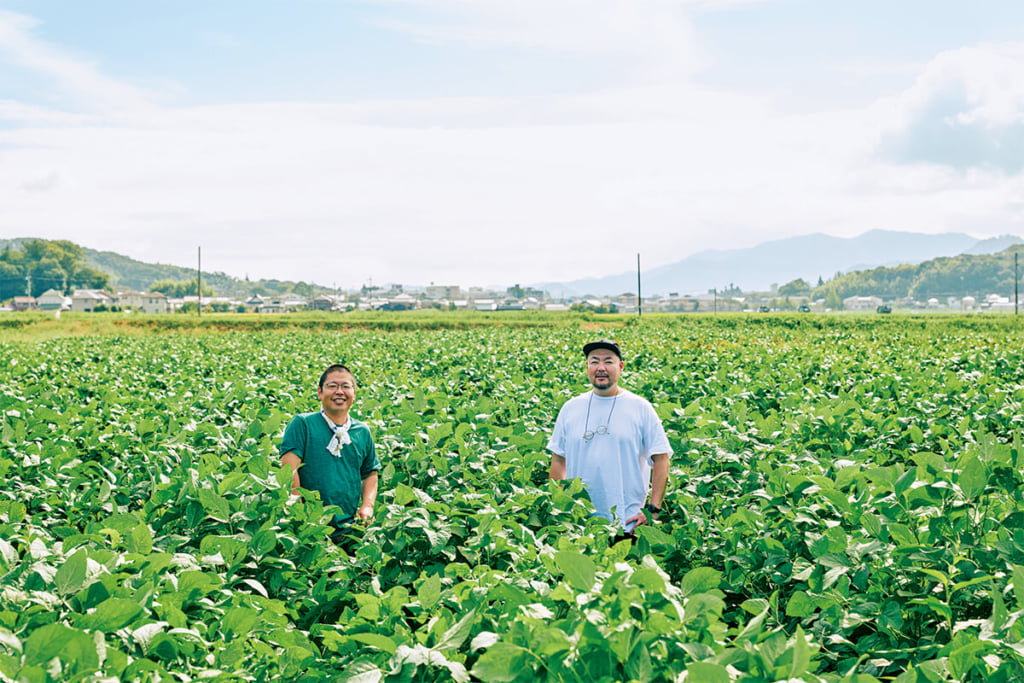
The height of the ridges is over 50 cm. Stems and leaves grow to over 1 meter in height. In 2021, these traditional cultivation methods were recognized as a Japanese agricultural heritage.
高田裕介/Yusuke Takada
Born in 1977 in Amami Oshima, Kagoshima Prefecture. He moved to France in 2007 and opened the French restaurant La Cime in Osaka in 2010, earning two Michelin stars. In 2023, he ranked 8th in Asia’s 50 Best Restaurants.
Changing tastes depending on the harvest time
‘In early October, the first harvest is refreshing and pairs well with beer. Mid-harvest offers a mellow taste, while late harvest enhances depth and sweetness, with a chewy texture… the flavor changes every week. Although the pods turn brown with black spots, don’t be deterred by their appearance and enjoy them nonetheless.’
Tanba Tabuchi Farm
Located in the heart of the Shinoyama Basin, surrounded by mountains on all sides, Tanba Tabuchi Farm has been producing Tanba Kuro edamame using traditional cultivation methods for over 300 years. Every autumn, on the release day of Tanba Kuro edamame (October 7th in 2023), customers from outside the prefecture flock to the farm’s direct sales store. In addition to Tanba Kuro edamame, they also grow Koshihikari rice, Azuki beans, and strawberries. Events such as strawberry picking and edamame harvesting experiences are held to showcase the charm of Tanba Sasayama.
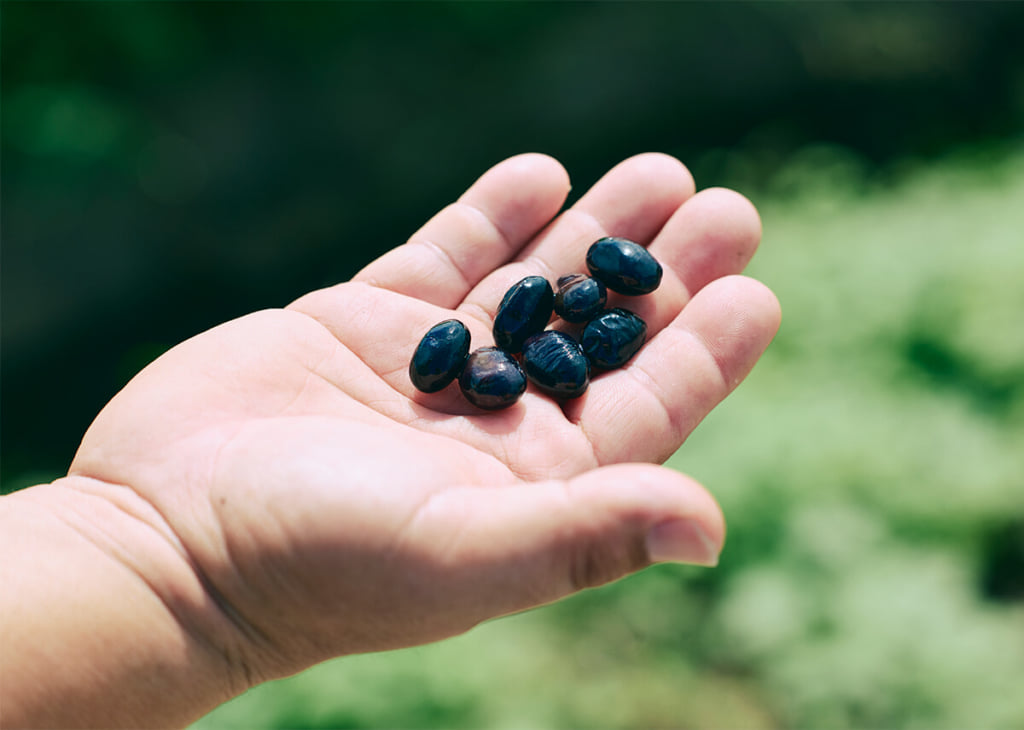
Tanba Kuro soybeans are approximately twice the size of regular edamame beans.
Address: 158-3 Kuchisakamoto, Tanba Sasayama City, Hyogo Prefecture
Tel: 090-8650-0415
Next, Chef Yusuke Takada visited Tanba Tanaka Livestock Farm, where they raise Tajima cattle, the origin and pinnacle of Wagyu beef.
‘Our Tajima cattle meet rigorous standards for growth environment and meat quality. Only those that clear these standards can be called Kobe beef later on, but ours are 100%,’ said the representative, Hisayoshi Tanaka. Tajima cattle, raised in clean and well-ventilated sheds with classical music playing in the background, are fed with organic fertilizer. Due to their environment, which considers animal welfare, they have won top awards in competitions.
Takada, who visited Tanba Sasayama’s specialty area, expressed, ‘I felt the passion of the producers. It’s the same with the artisans I deal with, I want to continue our long-term relationship.’ One of these longstanding relationships was with Hiroyuki Kusuda of METZGEREI KUSUDA in Ashiya, whom Takada visited at the beginning of his journey. They compete together in the Charcuterie World Championships and strive to improve together. ‘I use Tanba Kuro for terrines and Tanba Jidori for oven roasting,’ says Kusuda, also focusing on Tanba’s ingredients.
Tanba Tanaka Livestock Farm
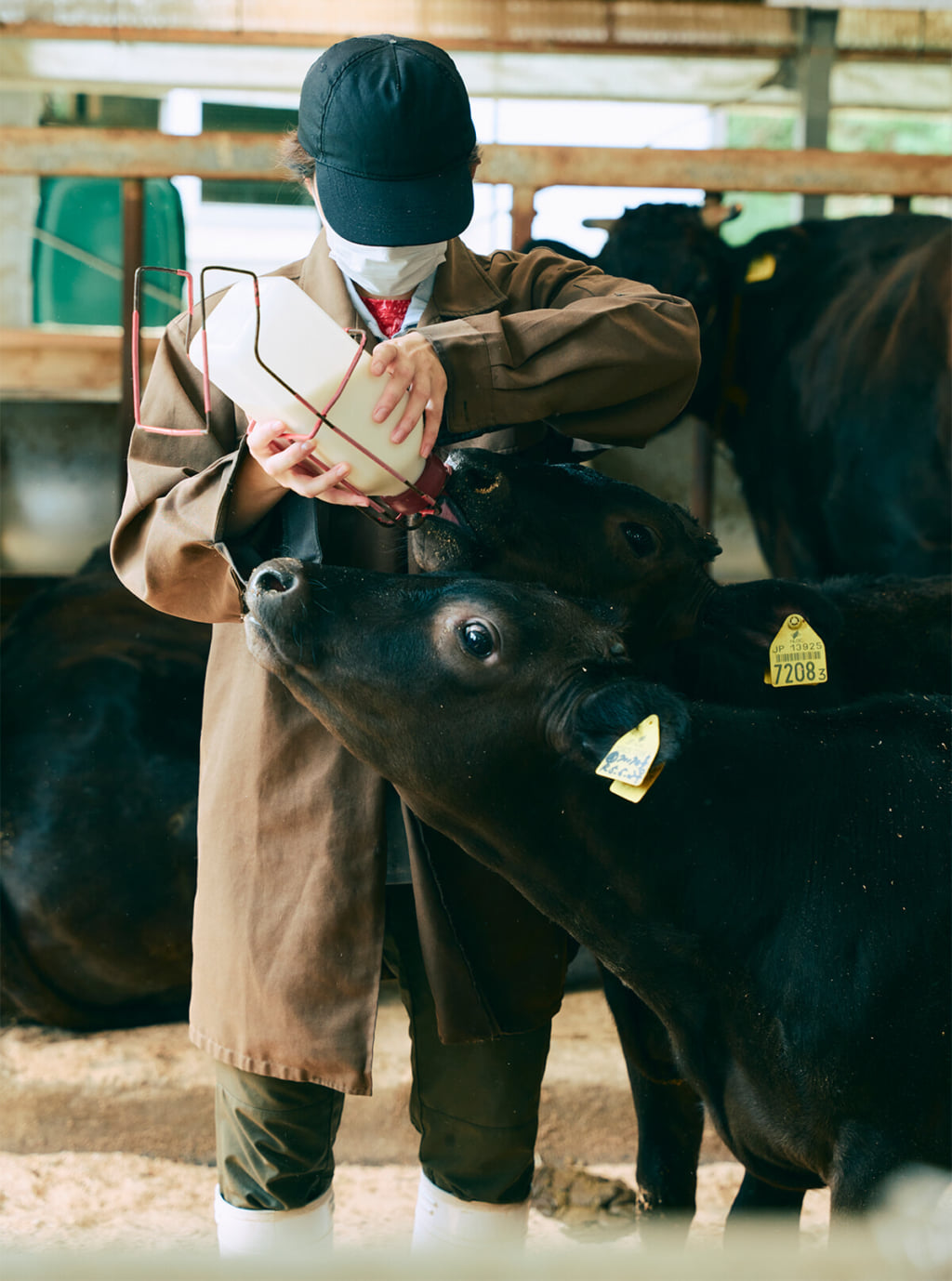
They lovingly raise about 230 head of cattle, including breeding cows and calves, with a staff of five people.

Tanba cattle, covered in soft fur likened to velvet, are known for their gentle demeanor.
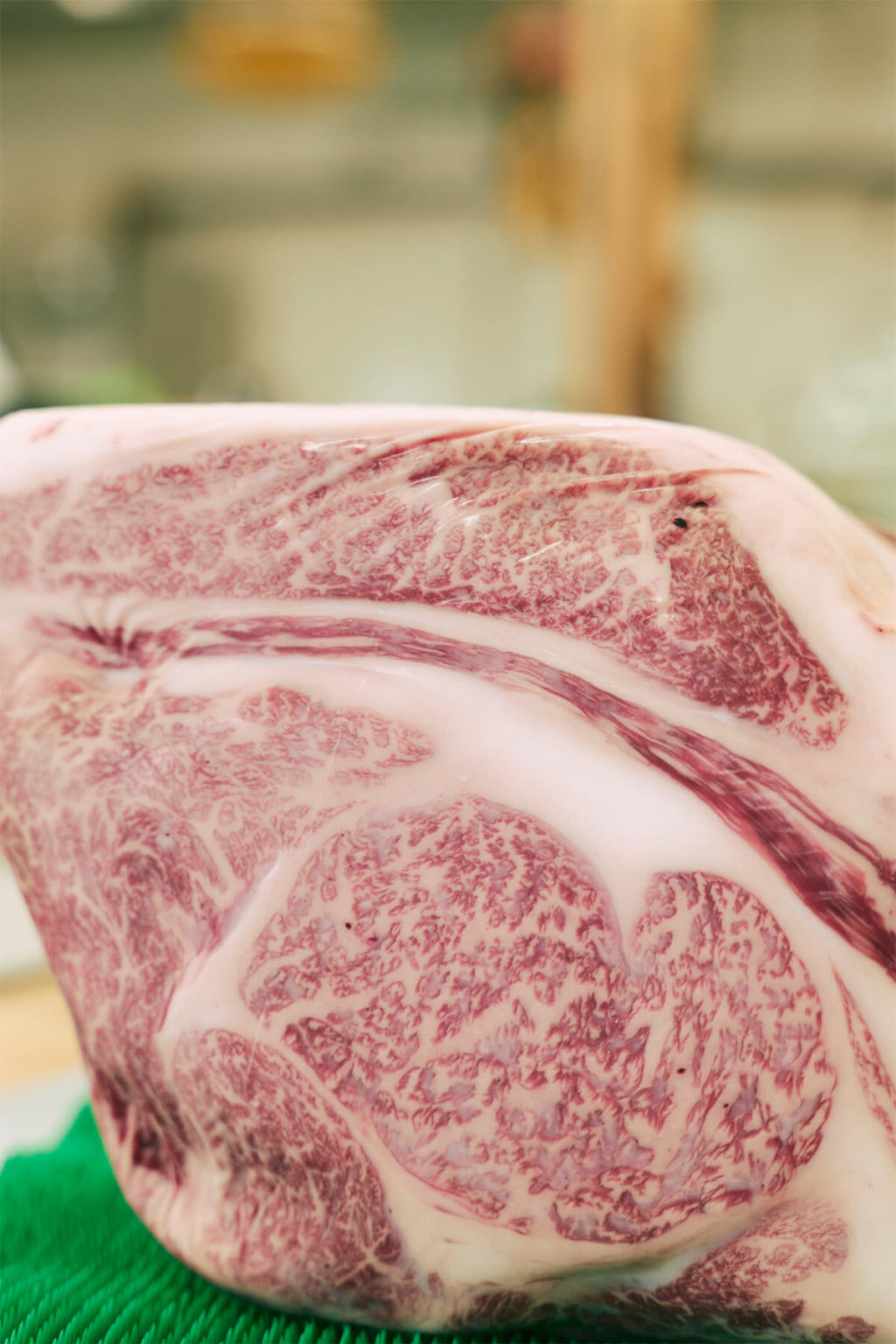
Niku no Bun sells premium cuts of meat. The fine marbling provides exquisite quality, with a melting point of 14-20 degrees Celsius, ensuring a delicious melt-in-your-mouth experience.
Address: 403-2 Amikake, Tanba Sasayama City, Hyogo Prefecture
Tel: 079-594-2919
METZGEREI KUSUDA Ashiya Store
After training in Germany and France, Hiroyuki Kusuda opened the METZGEREI KUSUDA Rokko Michi Store in 2004, followed by the Ashiya Store in 2009, where dining in is also available. Following traditional German methods, they offer 60 varieties of ham and sausages, faithfully reproducing the authentic flavors. KUSUDA Artisan Charcutier, making its debut in Tokyo, is scheduled to open in Azabudai Hills.
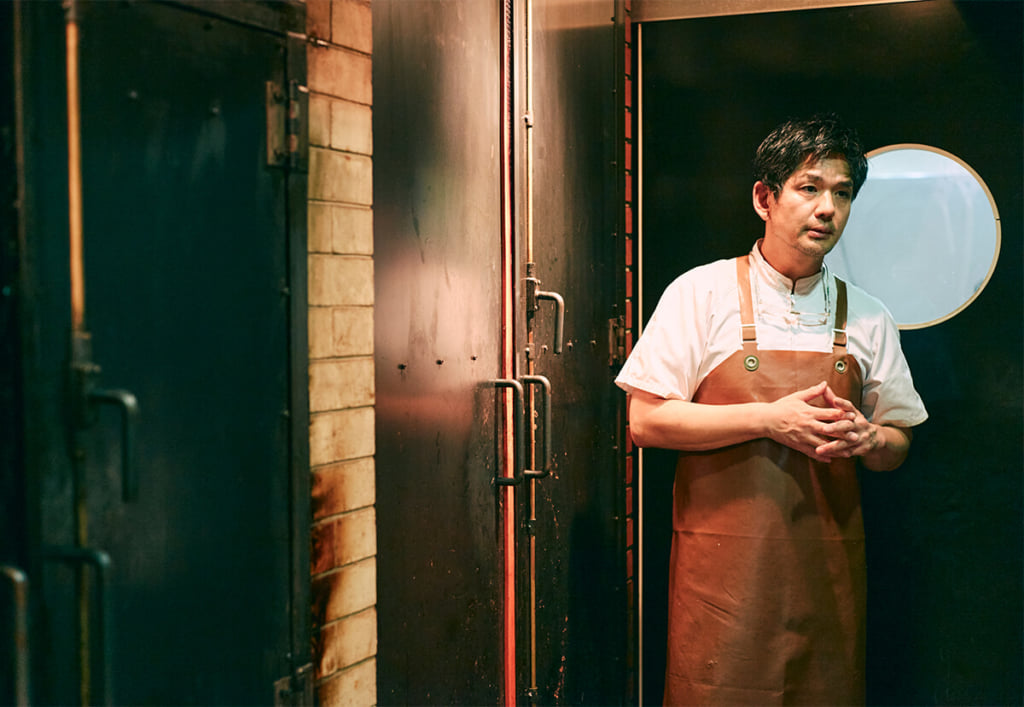
The bacon is smoked for three days and nights in a brick kiln specially ordered from Kobe Steel.
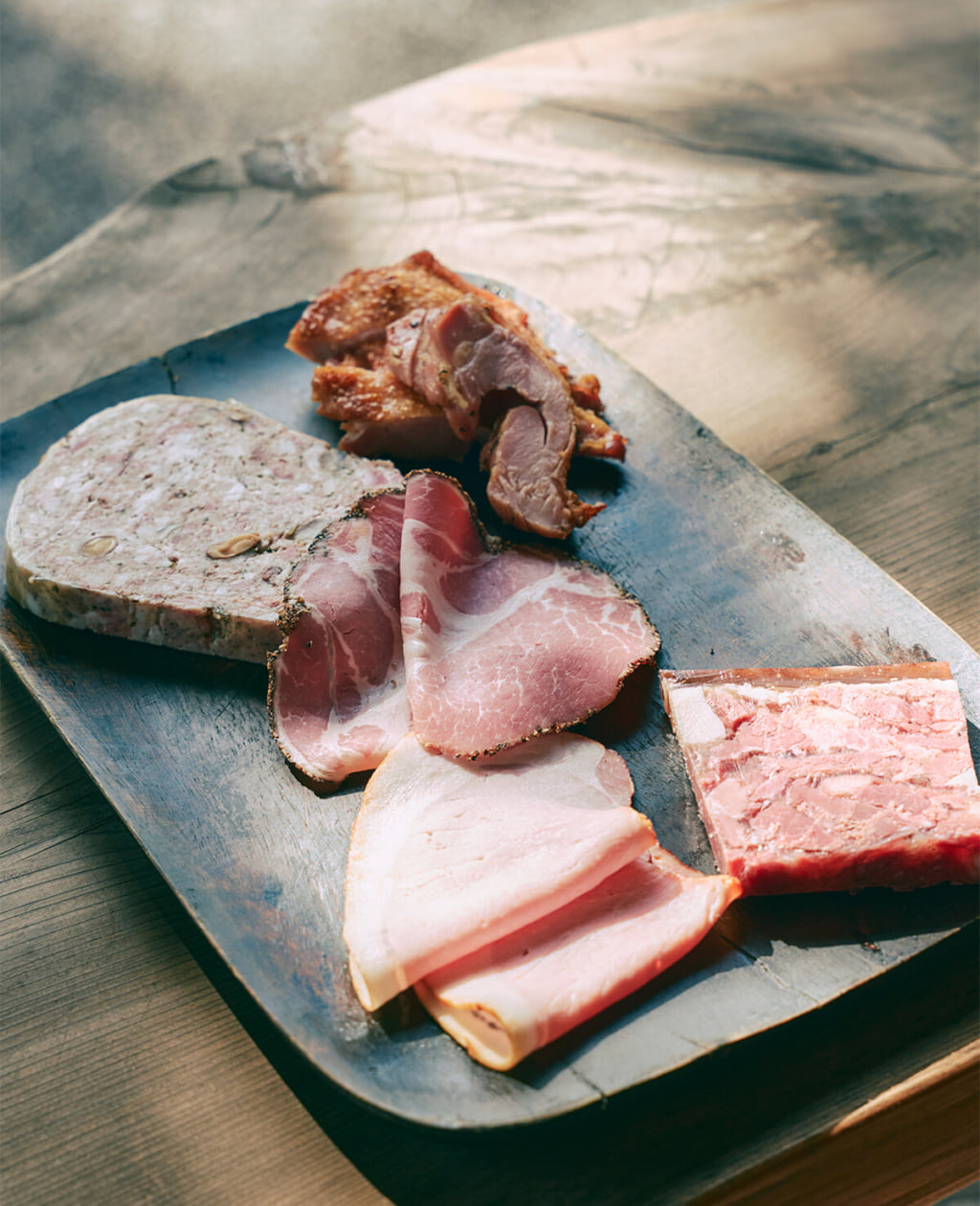
Clockwise from the top right: ‘Poulet Roti’ (100g) made with ‘Tanba Jidori’, ¥480; ‘Fromage de Tête’ (100g), ¥700; Roast Ham (100g), Pepper Ham (100g), each ¥950; ‘Pâté de Campagne’ (100g), ¥580.
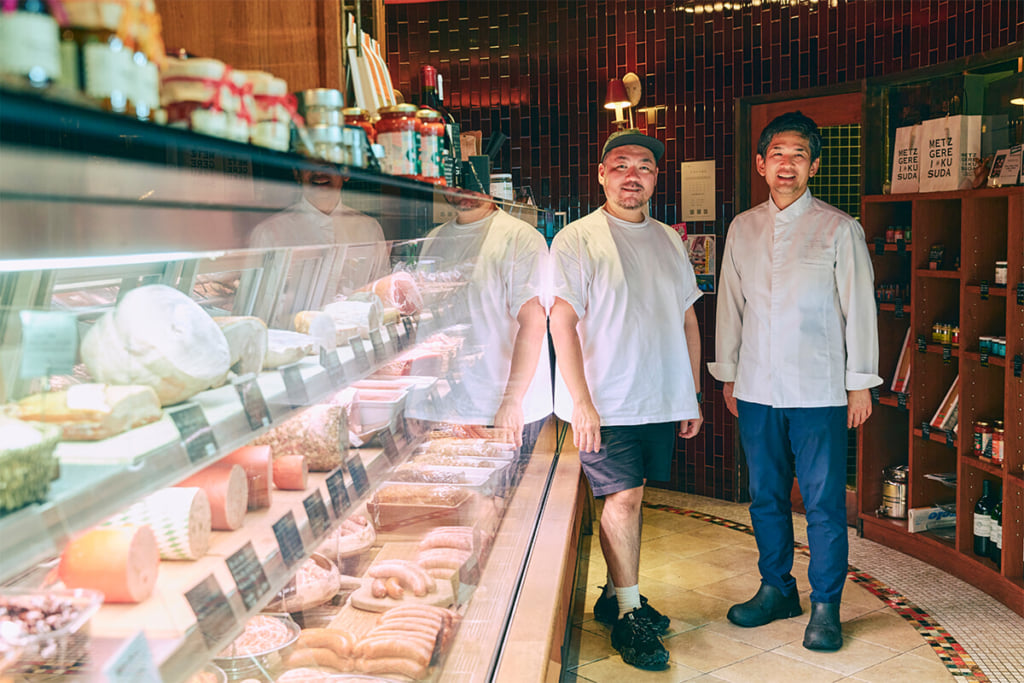
The ‘Boudin Noir’ used in Takada's specialty ‘Boudin Dog’ is sourced from the same shop.
Address: 12-19 Miyazuka-cho, Ashiya-shi, Hyogo Prefecture
Tel: 0797-35-8001
Hours: 10:00 AM – 6:00 PM
Closed: Wednesdays, 3rd Tuesdays
*Other irregular closures may apply
Yamazatoryouri Maekawa
Born and raised in Tanba Sasayama, the owner, Tomoaki Maekawa, honed his skills in places like Kyoto before opening his own restaurant in his hometown in 2017. After 20 years, he relocated to the east side of the castle town. Together with his father, he grows rice and vegetables in the fields, and makes miso. He also acquired a hunting license and personally hunts and butchers game.
Most of the ingredients served in the restaurant, such as deer ham finished with low-temperature cooking, are sourced from Tanba Sasayama. Drawing from the wisdom of his ancestors, especially his grandmother, he creates richly flavored Sasayama cuisine rooted in local traditions.
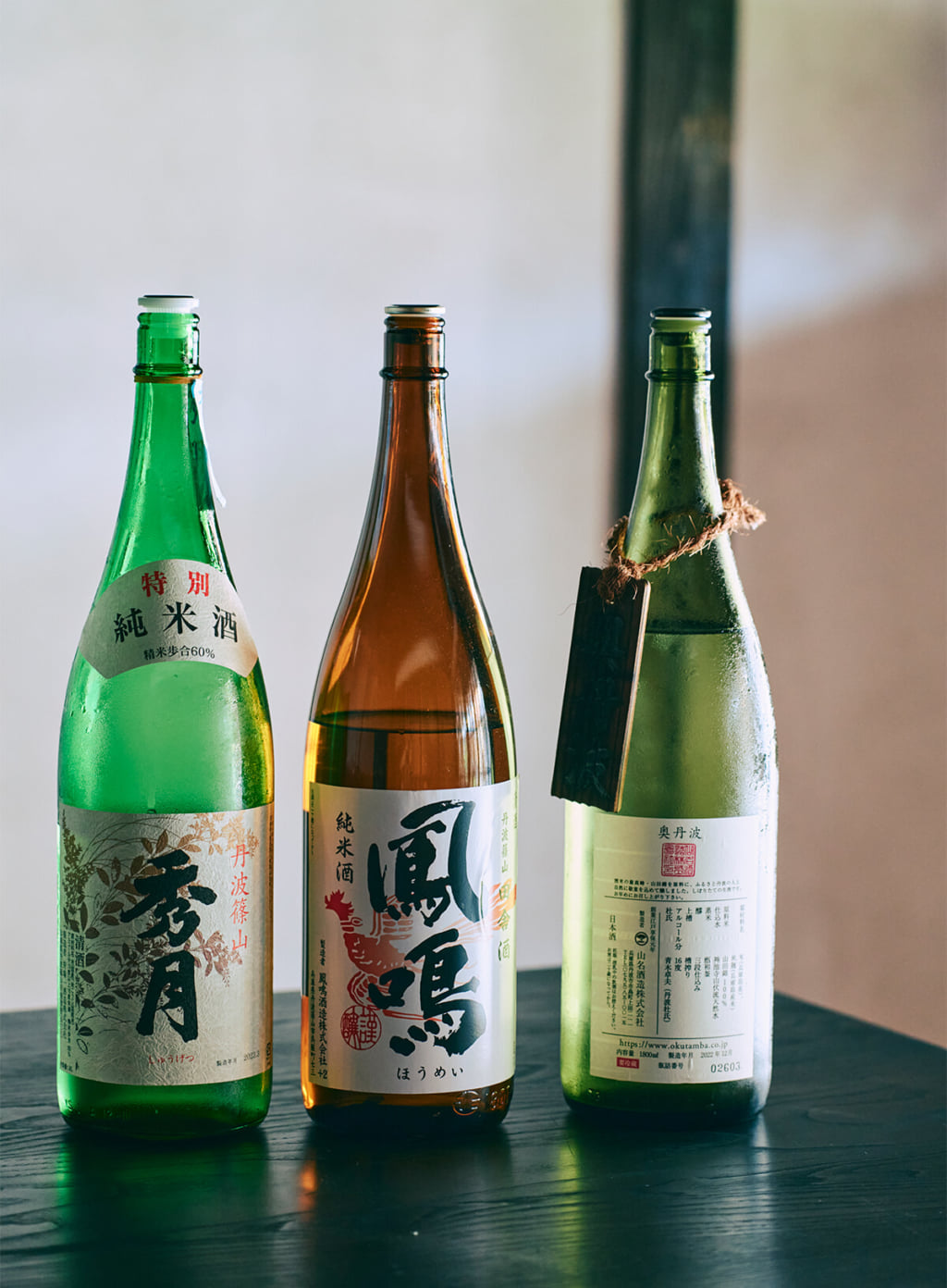
In the restaurant, the sake is also sourced from Tanba. From left to right, special junmai sake ‘Shugetsu’ and ‘Houmei,’ each 180ml for ¥900, and a seasonal limited edition ‘Okutanba Kizara’ made with Yamada Nishiki rice, 180ml for ¥1,000.
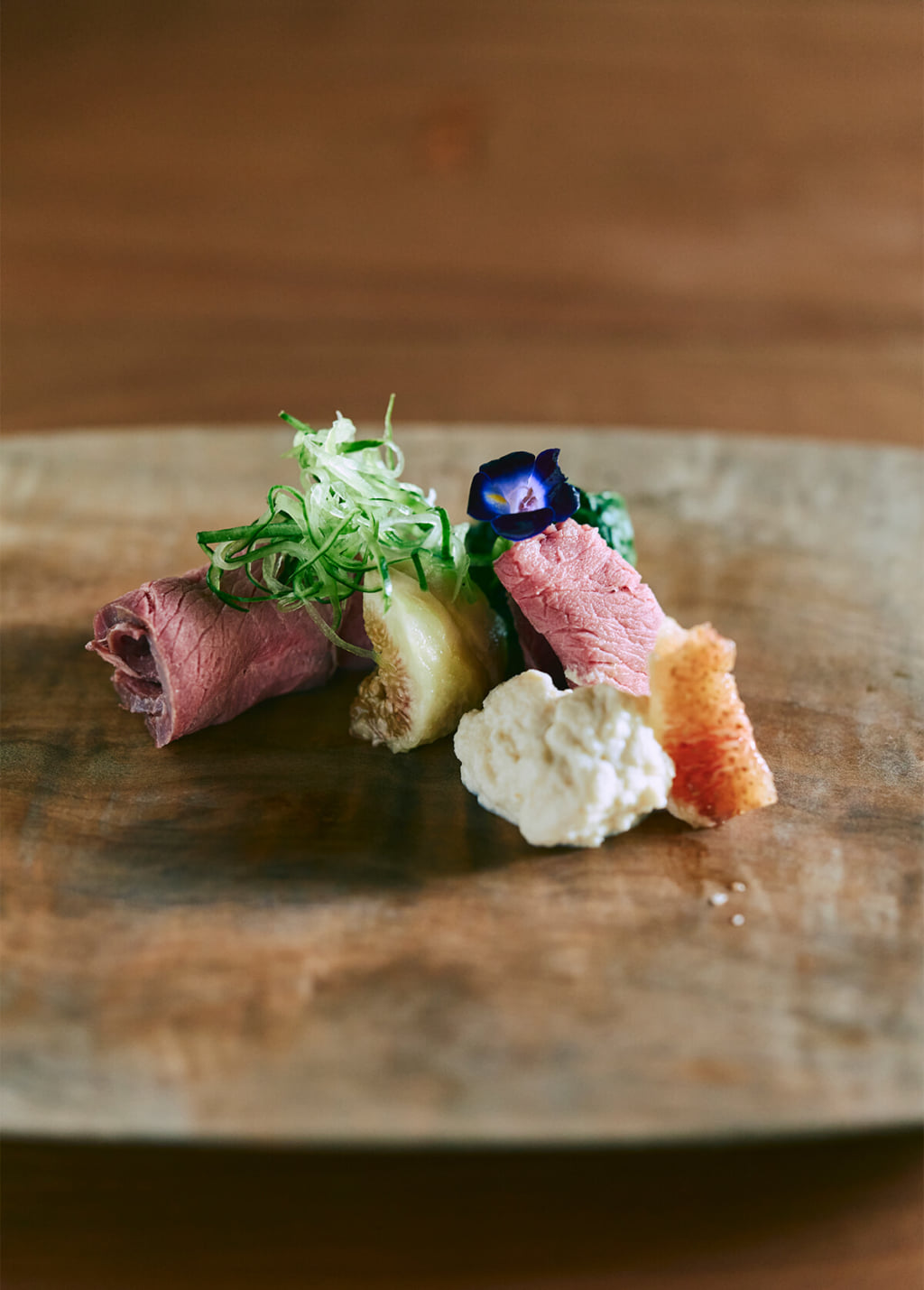
The dishes are all part of the ‘Maekawa Course’ which offers a total of seven dishes for ¥6,400. The ‘Furusato Course’ (¥10,000) is also recommended, served with deer ham accompanied by ‘tsurumurasaki’ (Japanese yam), fig, and ‘shiro-ae’ (tofu salad).
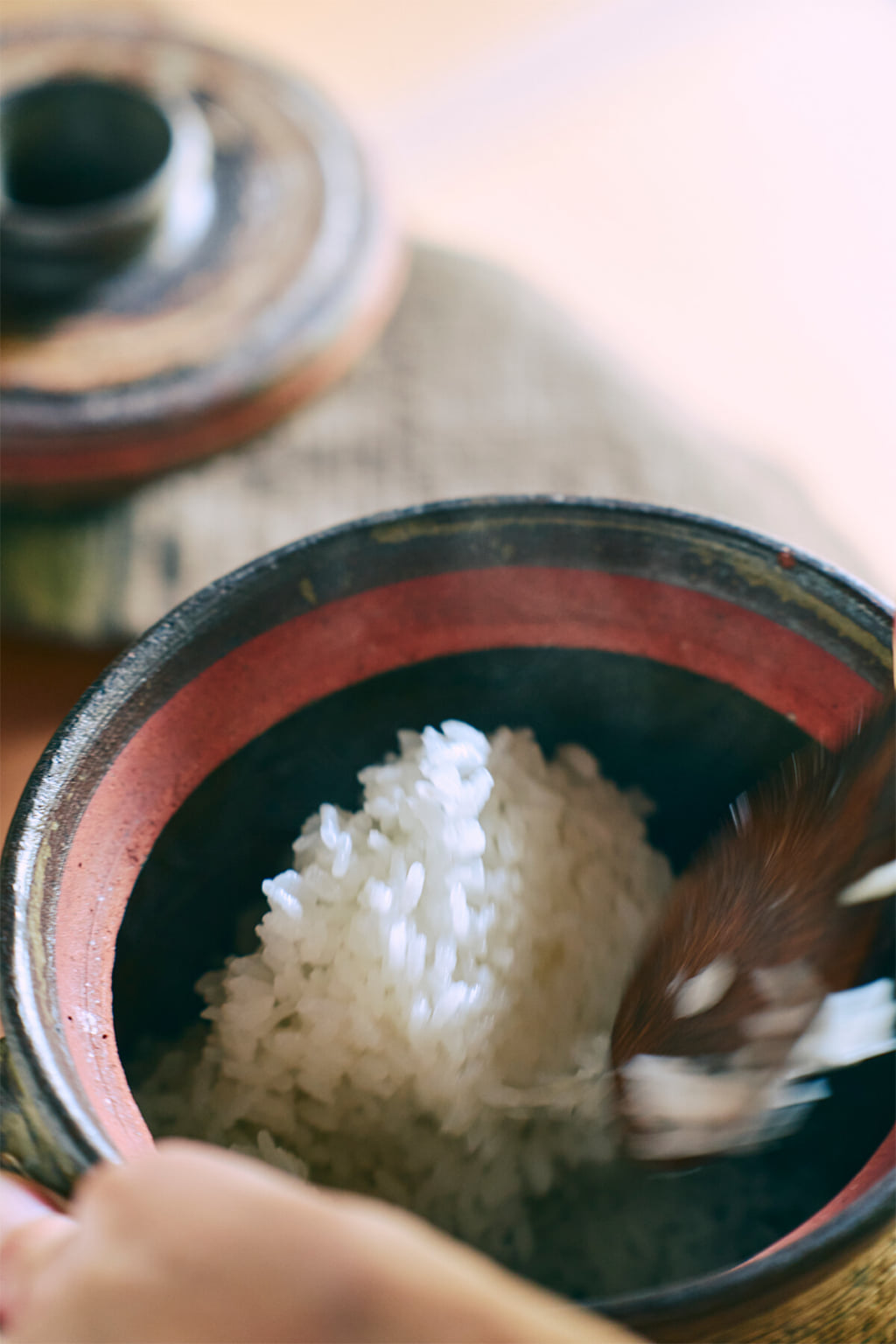
Chef Yusuke Takada cooked ‘Koshihikari’ rice, which he personally hung on the rice rack, in an earthenware pot.
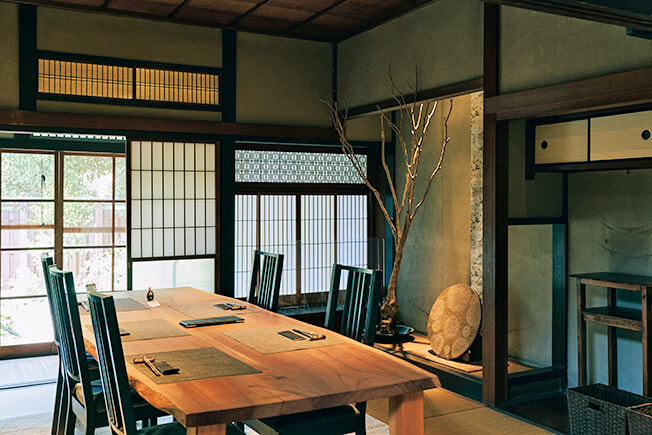
A renovated 150-year-old townhouse which also features private rooms facing the inner courtyard.
Address: Hyogo Prefecture, Sasayama City, Tatemonocho 93
Tel: 090-2065-4595
Hours: 11:30-14:00 (Last order), 17:00-19:00 (Last order)
Closed on Mondays
*Irregular closures may occur
Embracing Tanba’s Spirit: Artisans Embracing Innovation
The Tanba area is the birthplace of one of Japan’s three greatest sake brewers, the Tanba Toji. Founded in 1849, Nishiyama Sake Brewery is a long-established sake brewery that has developed alongside the Tanba Toji. Its flagship brand, ‘Kotsuzumi,’ was named by the haiku poet Kyoshi Takahama and was beloved by many literati. To guide Takada, the Toji representative Yajima Korei leads him to a well on the brewery’s premises named ‘Tsubaki Jutenno’.
‘We were struck by three past floods, but miraculously, the well remained intact. We use the ultra-soft water from the well, which is fed by the underground water of the Taketa River, as brewing water.’
After tasting both the brewing water and the brewed sake, Takada remarked, ‘It would make a great accompaniment to cuisine, enhancing the flavors.’
In addition to traditional sake brewing, they also cultivate rare sake rice varieties such as Hyogo Kitamidori and the now-discontinued legendary sake rice, Tanba Kyoriki. They leverage fermentation techniques to develop products like amazake yogurt, not only inheriting tradition but also adapting sake brewing to meet modern needs.
Nishiyama Sake Brewery
A long-established sake brewery founded in 1849. Brewing brands such as Kotsuzumi with a focus on seasonal brewing, offering fresh sake throughout the year. Renovating a 127-year-old wooden brewery building, a complex facility called Kodento is set to open within the year, featuring a fermentation-inspired café, sweets shop, gallery, and accommodation. It aims to disseminate fermentation culture from the Tanba region.
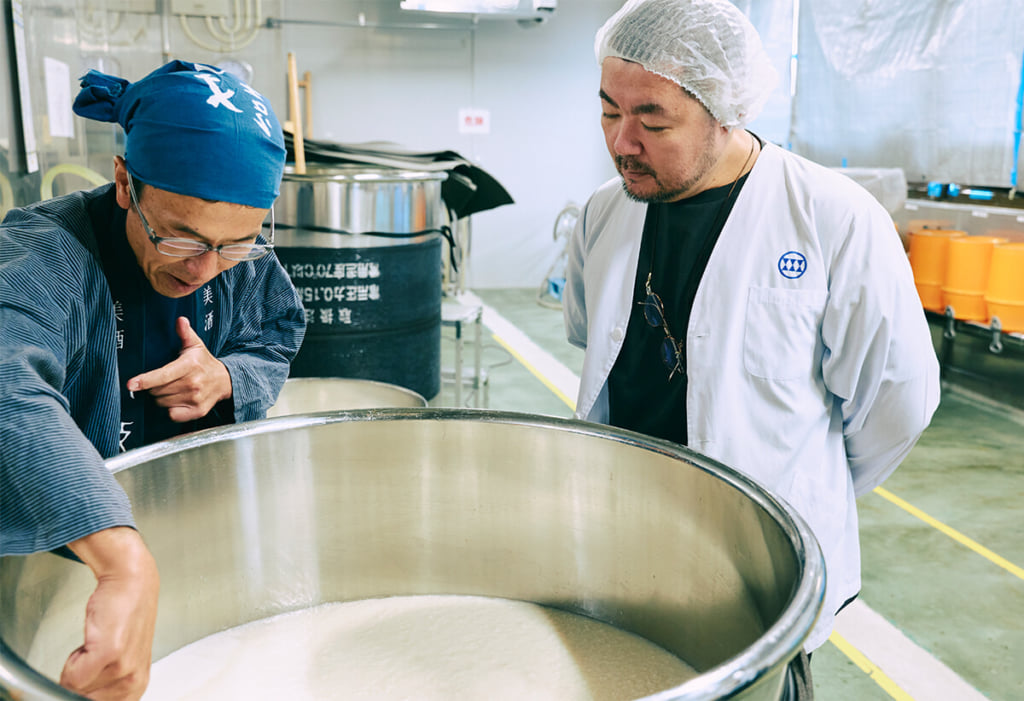
Master brewer Korei Yajima (left) explains the process of making sake yeast starter, an essential step in sake brewing.
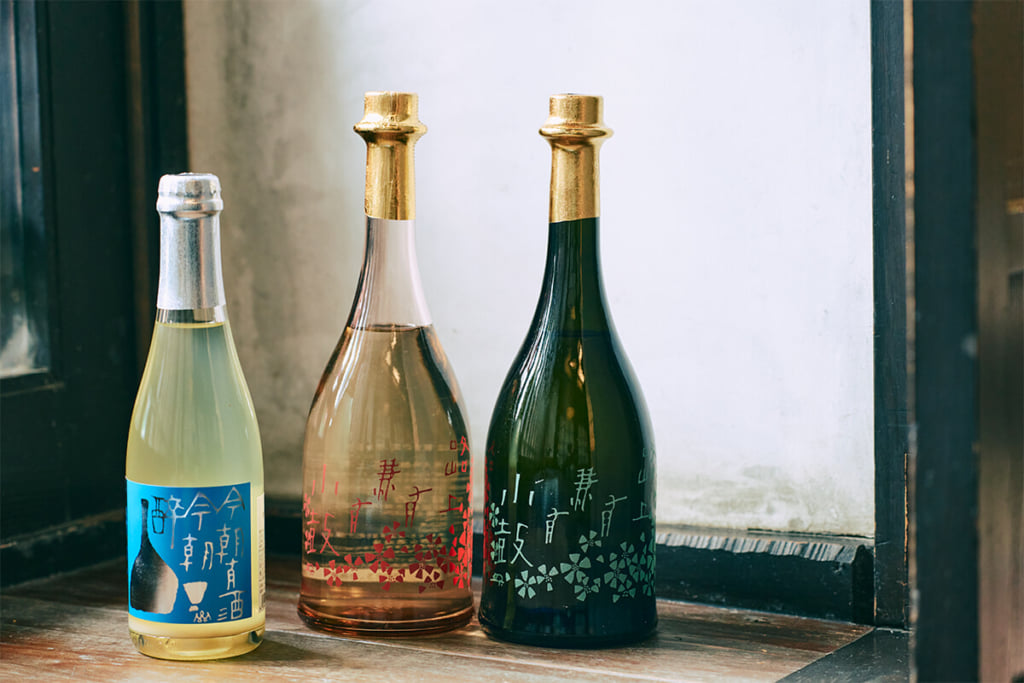
From left to right: ‘Bihaku Koushu’ 360ml ¥1,320, bursting with refreshing acidity, ‘Rojo Yuuka Peach Blossom’ 720ml ¥2,420, made with Hyogo ‘Kitakomachi’ rice, ‘Rojo Yuuka Black Peony’ 720ml ¥3,630, brewed with Tanba Strong rice.
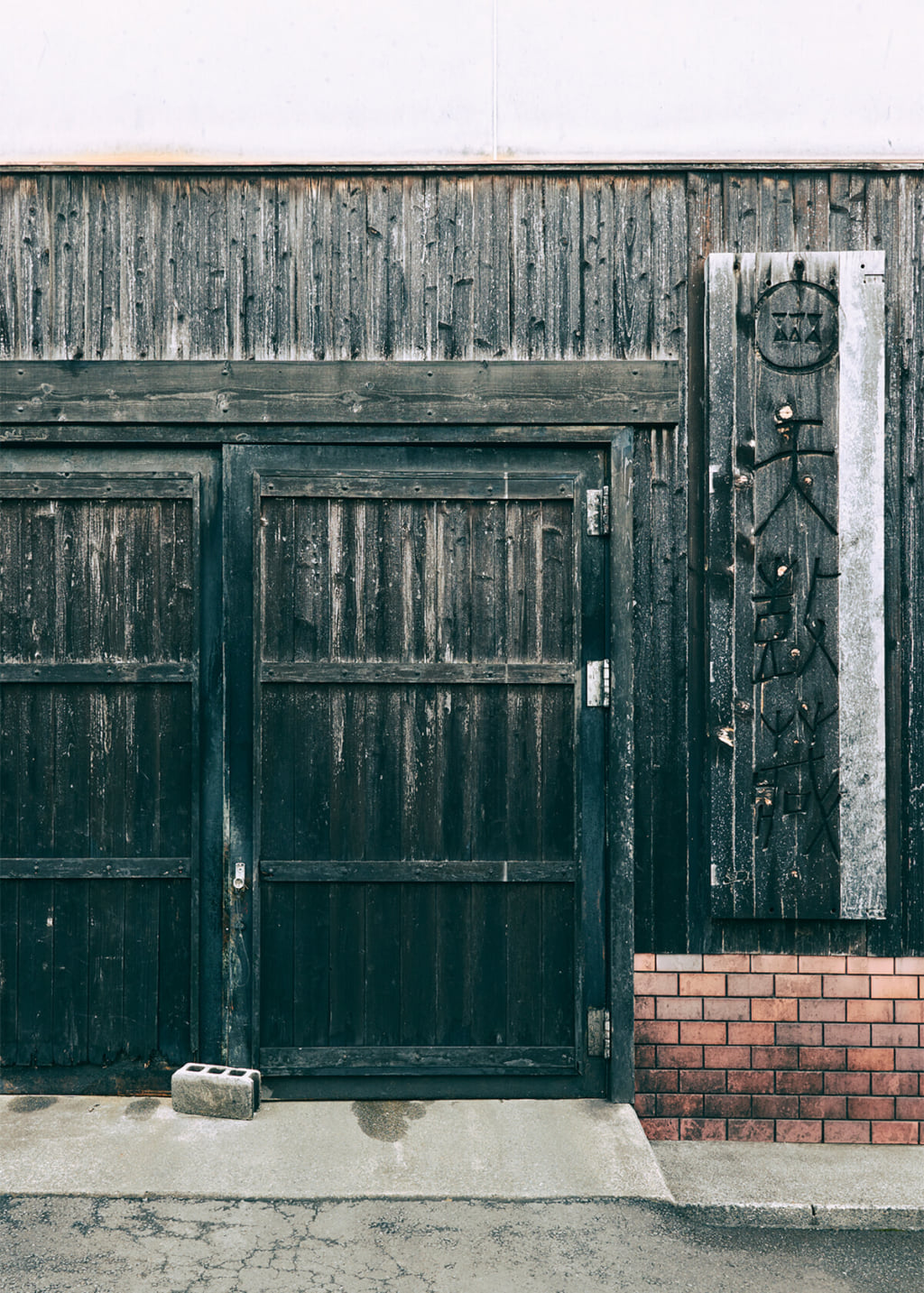
Signboards and other items are designed by the artist Hirosuke Watanuki.
Address: 1171 Nakatakeda, Ichishima-cho, Tanba-shi, Hyogo Prefecture
Tel: 0795-86-0331
Also in Tanba, Keisuke Fuki, the 11th generation of the Fuki Farm, brings a new perspective to a family business that has been passed down since the Edo period. After studying cheese making in Hokkaido, he returned home and established the Tanba Cheese Factory on the farm. He raises Jersey cows, feeding them home-grown rice straw and wild plants from the fields. By adding self-cultivated lactic acid bacteria to fresh milk squeezed from these cows, he produces cheese that undergoes long-term aging in the cellar for over 12 months.
He explains, ‘Even in its place of origin, such meticulous care is rarely seen.’ His endeavor bore fruit when he won the highest award at the All Japan Natural Cheese Contest with his first entry. Chef Yusuke Takada, inspired by his travels in the Tanba area, remarked, ‘Here, where such abundant nature remains, it’s a treasure trove of ingredients. Above all, it’s the passion of the producers that truly distinguishes these specialties.’ Through his journey in Hyogo’s terroir, Takada realized that the charm of a region stems from its environment and its people.
Fuki Farm
Fuki Farm, which has been engaged in agriculture for generations, cultivates up to 120 different crops annually. The eldest son, Keisuke, who has been interested in fermentation, maintains the compost heap during his dormitory life. The farm raises cattle on grass and rice straw from the fields, squeezes milk to make cheese, and utilizes cow manure as fertilizer for the fields, engaging in a cyclical farming approach. The cheese is available for purchase at the nearby Michi-no-Eki (Roadside Station) called ‘Tanba Obaachan’s Village’ and at the farm’s shop, which is open only on Sundays.
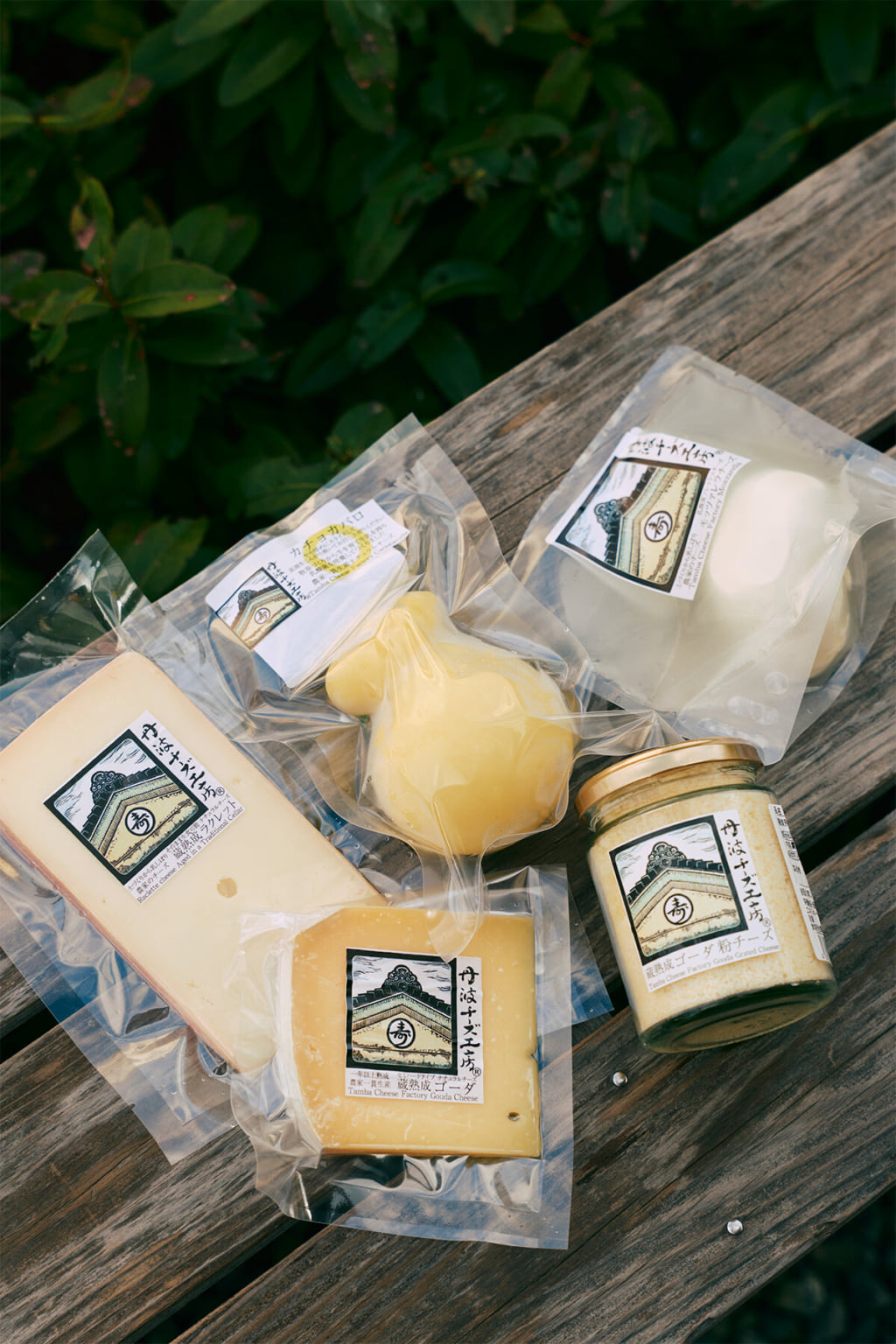
Various cheeses are available. Starting from the top right and going clockwise: Mozzarella (90g) for ¥500, Cellar-Aged Powder Cheese (95g) for ¥1,300, Cellar-Aged Gouda (100g) for ¥1,200, Raclette (150g) for ¥1,500, and ‘Caciocavallo’ (200g) for ¥1,400.
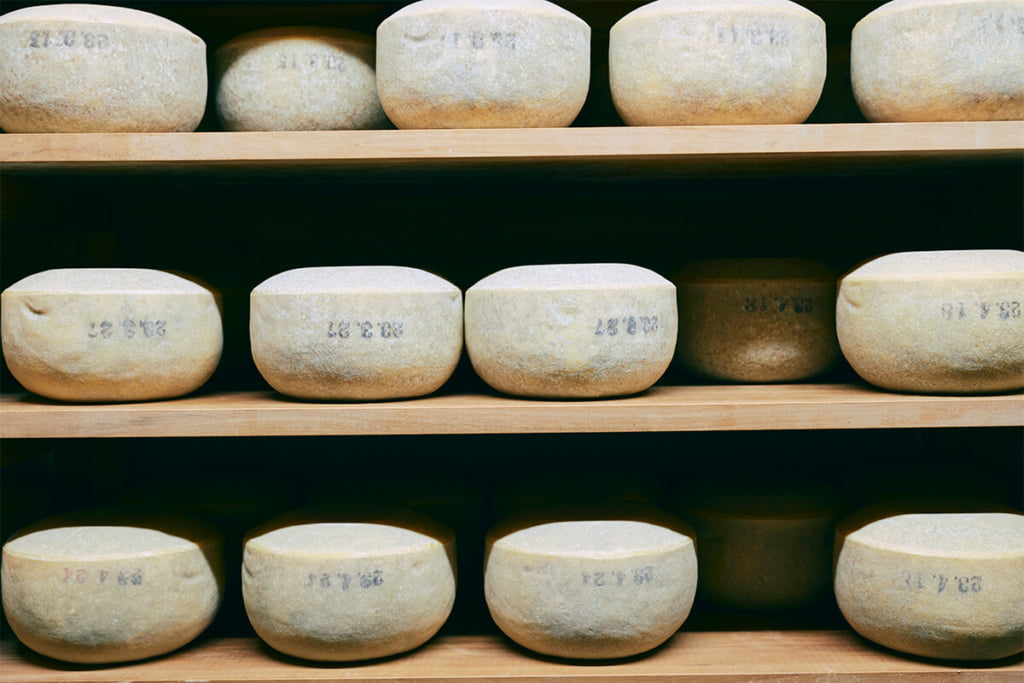
An 80-year-old warehouse converted into a maturation chamber. Cheese is polished daily and aged.
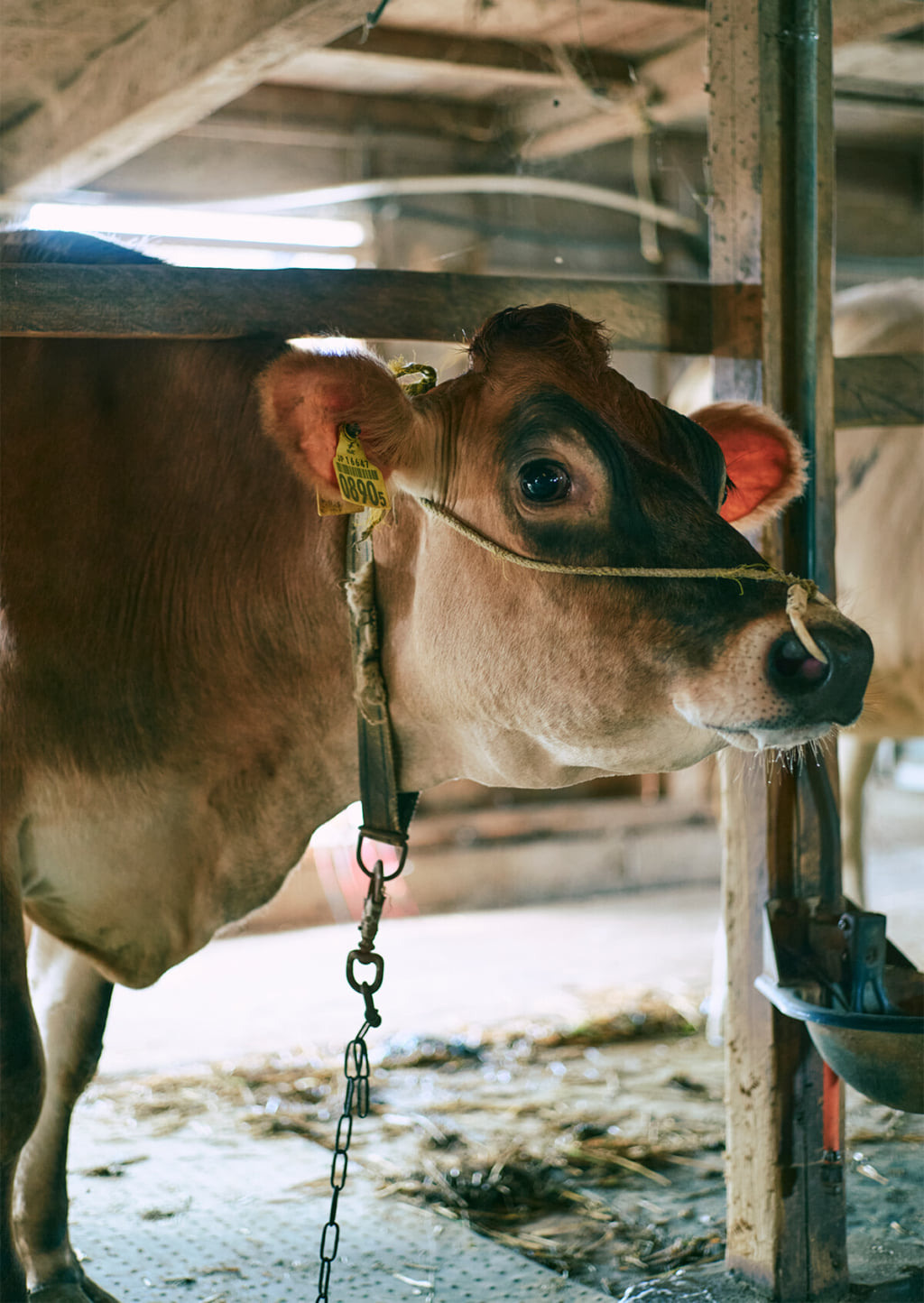
Jersey cows produce rich milk.
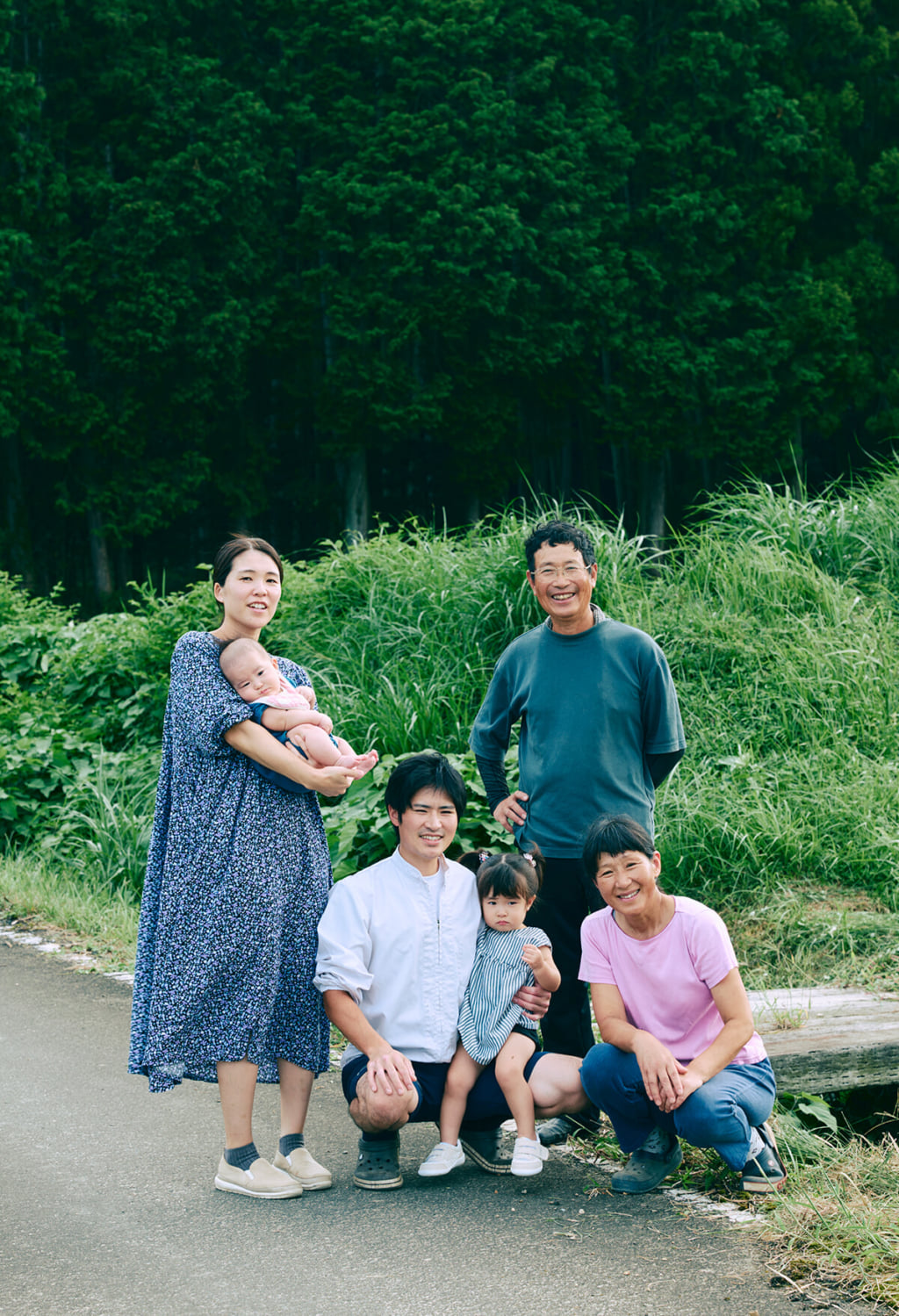
Fuki Farm representative Fuki Katsunori, along with his mother, eldest son Keisuke, and wife, operate farming and dairy farming as a family.
Address: 83 Nomura, Kasugacho, Tanba City, Hyogo Prefecture
Tel: 0795-74-0820
Olmo
This restaurant’s chef has an unusual background, having transitioned from being a Tokyo Metropolitan Government employee to acting as a tour guide in Australia before awakening to the world of food, and undergoing training at the renowned Osaka restaurant Piano Piano. The restaurant features dishes that incorporate local Tanba ingredients, such as fully ripened red Wanigajiro peppers, white bitter gourds sourced from nearby contracted farms, fresh mozzarella cheese from the Tanba Cheese Factory at Fuki Farm, and Tanba Jidori chicken. The ‘Tanba Blessings Assorted Appetizers’ plate, showcasing these Tanba ingredients, is a must-order. It offers a delightful journey through the four seasons of Tanba.
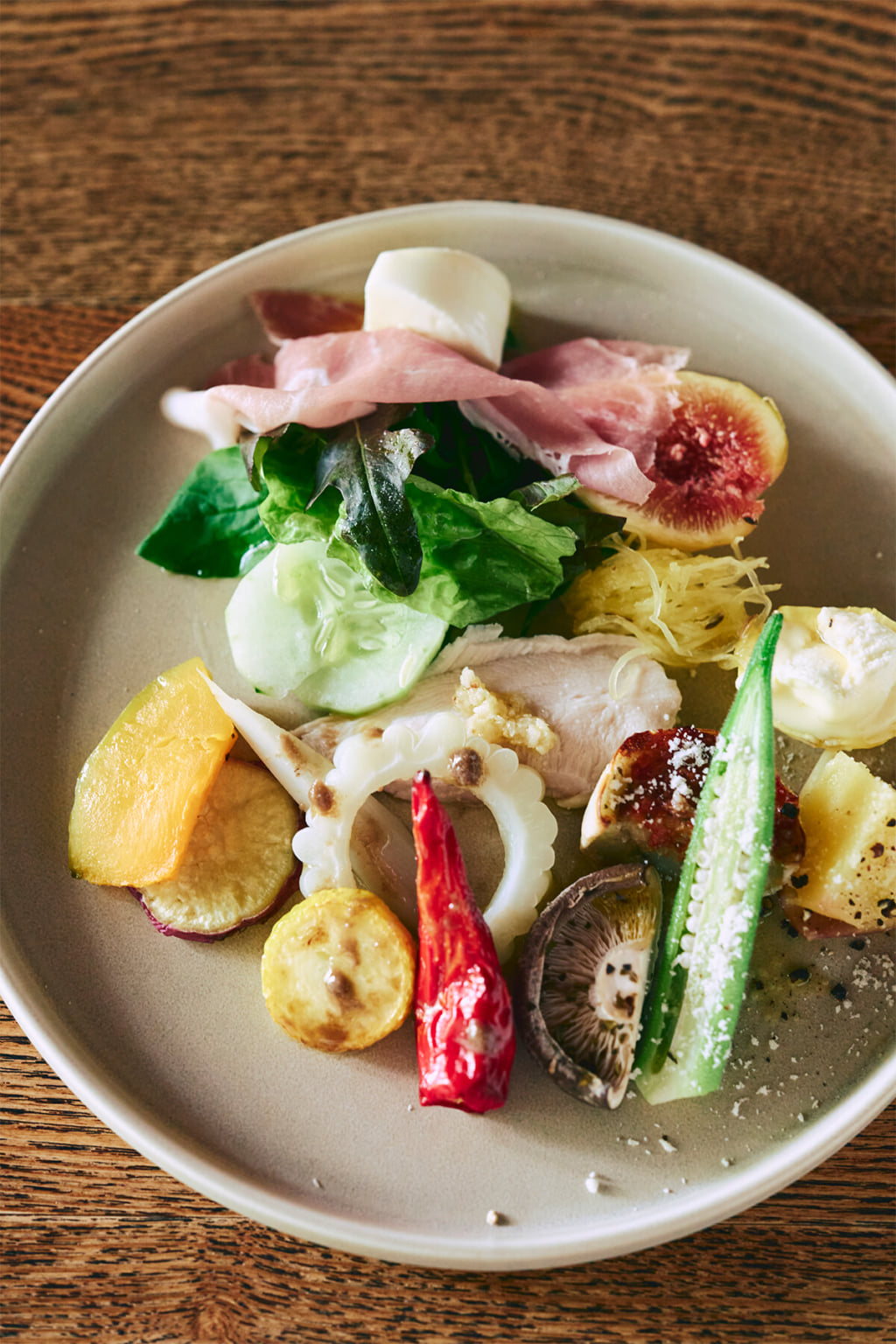
The dishes are all part of the lunch course starting from ¥1,800. The ‘Tanba Blessings Assorted Appetizers’ features local ingredients such as figs with a sugar content of 15 degrees and ‘Tanba Jidori’ chicken ham, showcasing the flavors of the region.
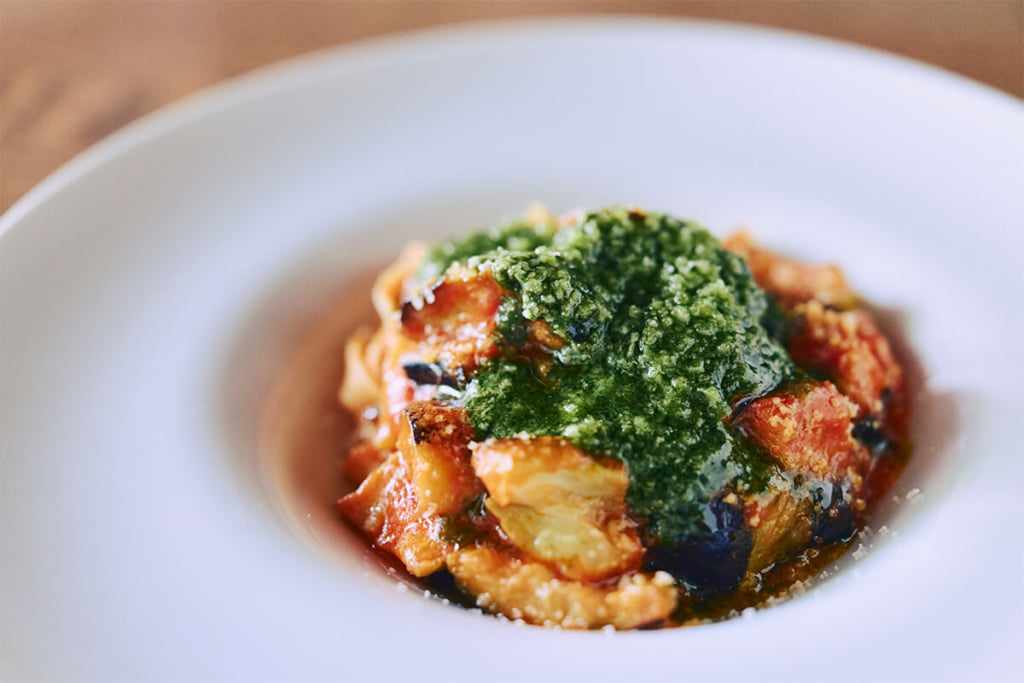
Rich Flavor Autumn Eggplant and Tomato Sauce Pasta with Basil Sauce.
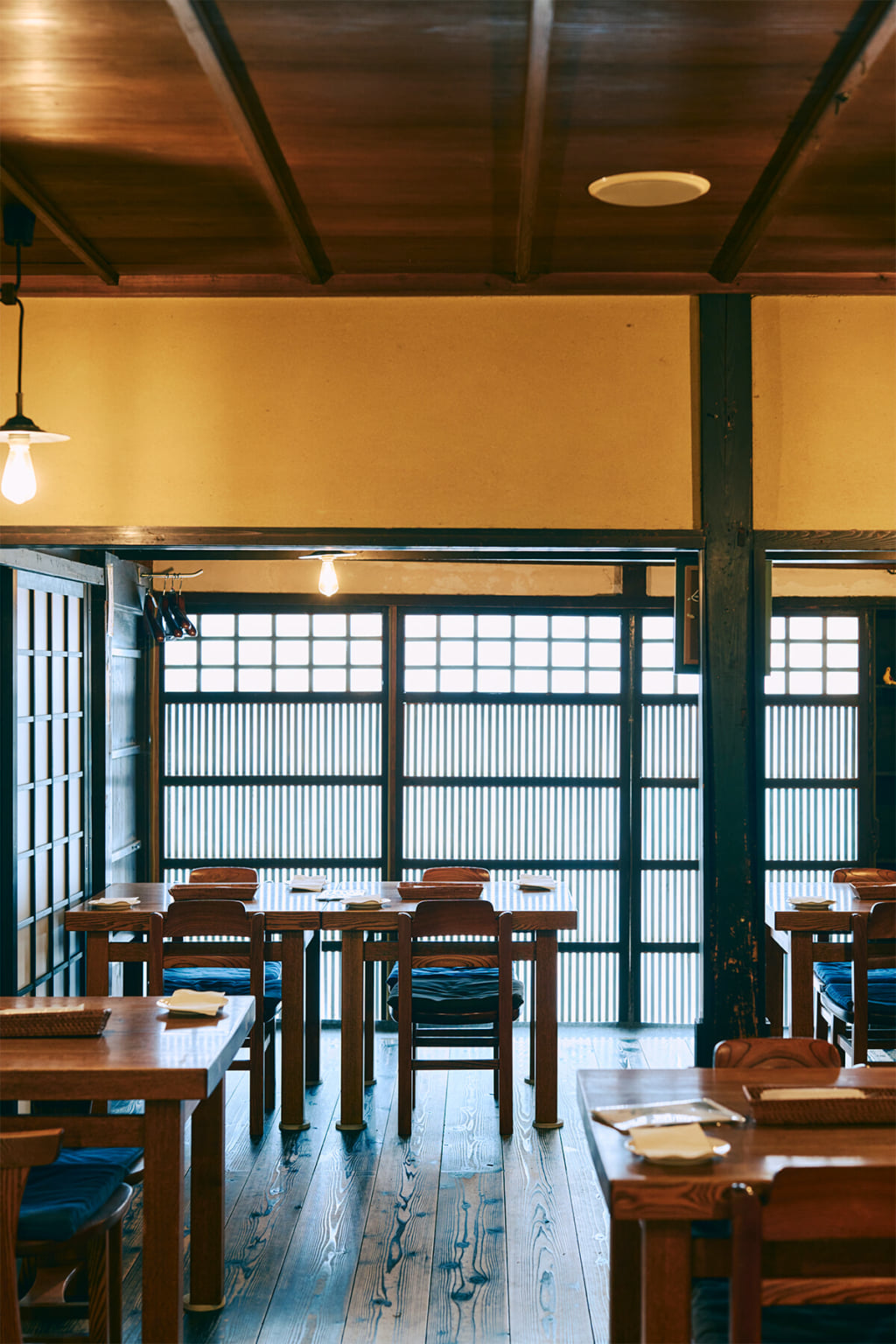
Conversion of a Former Kimono Shop Dating Back Over 150 Years.
Address: 119 Kashiwara, Kashiwara-cho, Tanba-shi, Hyogo Prefecture
Tel: 0795-73-3500
Hours: 11:30 AM – 2:00 PM (Last order), 6:00 PM – 8:30 PM (Last order)
Closed: Tuesdays, 1st Wednesday of the month
If you’re staying, come here!
Shinoyama Castle Town Hotel Nipponia
Nipponia is a decentralized hotel that restores and revitalizes historic buildings and old folk houses remaining throughout the country. Its first establishment opened its doors in 2015 in the castle town of Shinoyama, boasting a history of 400 years. It comprises nine accommodation buildings with varying charms, including a former residence of a bank executive from the early Meiji era and tea houses from the late Edo period, totaling 20 rooms.
Each building is named after a chrysanthemum variety with ties to the former Shinoyama domain, such as Sawashiro and Onae. Located within walking distance of Shinoyama Castle and samurai residences, guests can immerse themselves in the lifestyle of Tanba Shinoyama.
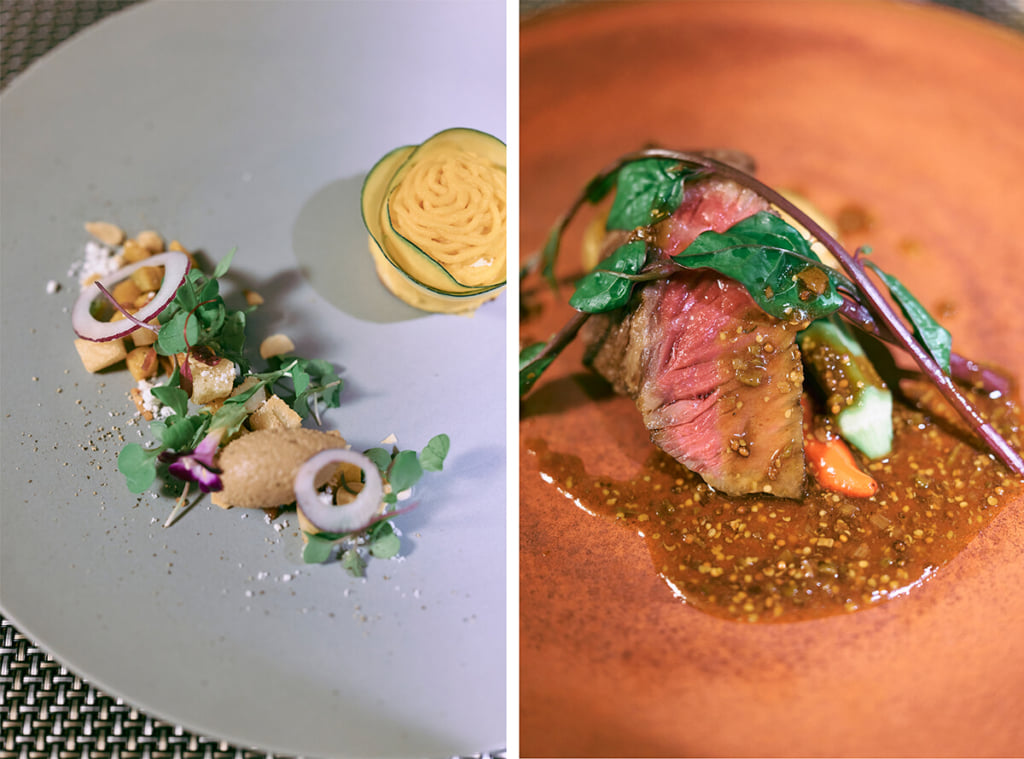
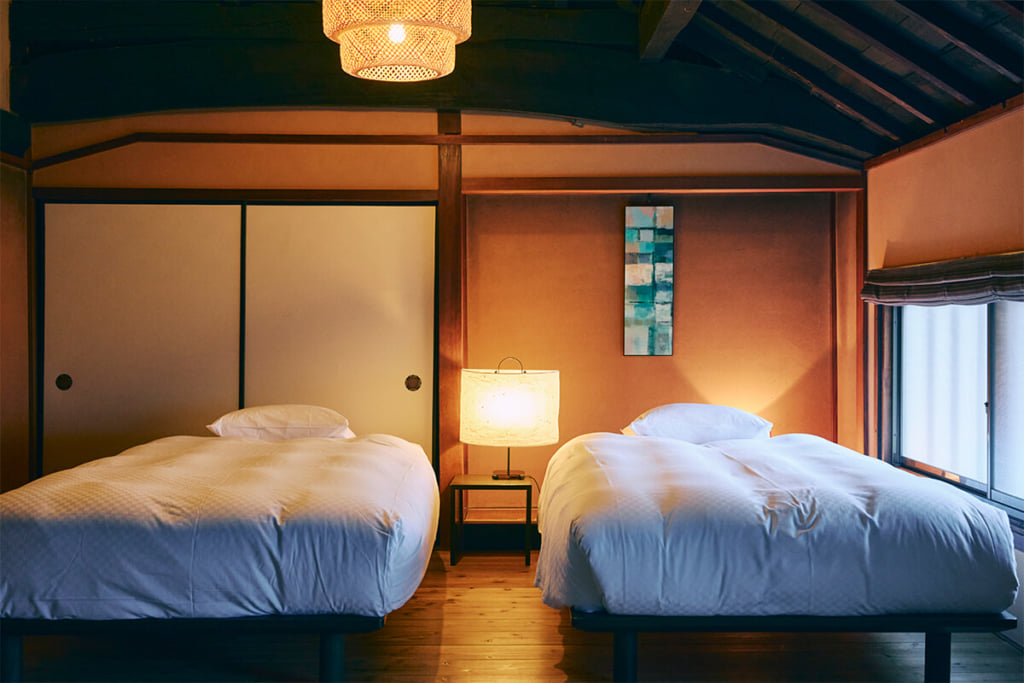
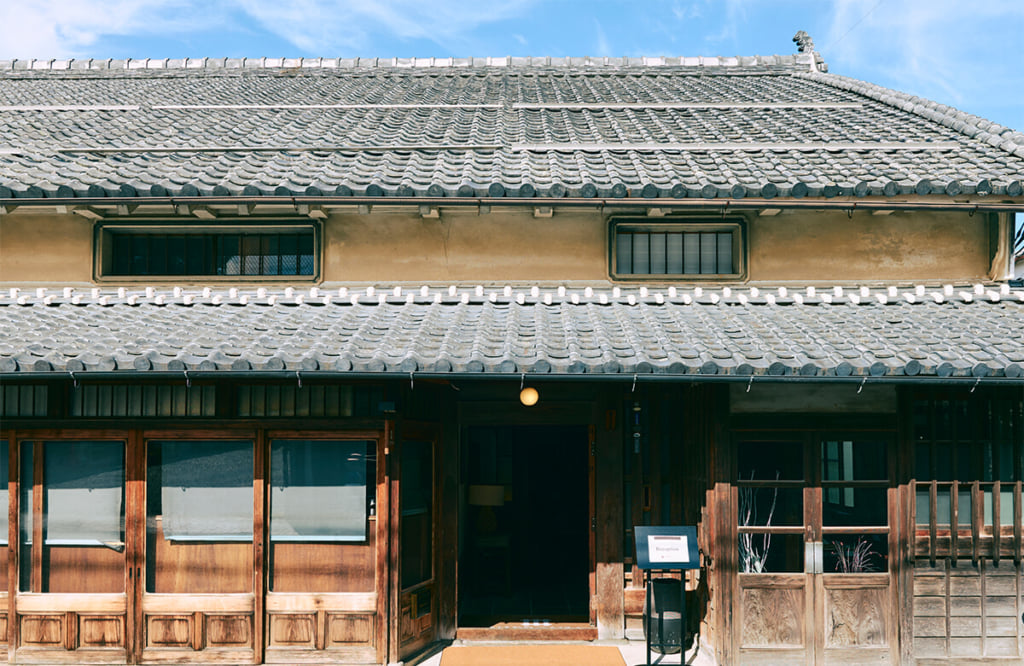
Contact:
Hyogo Destination Campaign Promotion Council Secretariat (Within the Hyogo Tourism Headquarters)
Tel: 078-361-7661
TRENDING
-
Ishiuchi Miyako, A Singular Perspective on Women
Recipient of the 2024 Women in Motion Award, the photographer creates intimate portraits of women through the objects they left behind.

-
Recipe for Ichiraku Ramen from ‘Naruto’ by Danielle Baghernejad
Taken from the popular manga with the character of the same name who loves ramen, this dish is named after the hero's favourite restaurant.

-
Namio Harukawa, Master of Japanese SM Art
'Garden of Domina' offers a dive into the world of an icon of ‘oshiri’, whose work has now reached a global audience.

-
The Tattoos that Marked the Criminals of the Edo Period
Traditional tattoos were strong signifiers; murderers had head tattoos, while theft might result in an arm tattoo.

-
The Emperor of Japanese Porn is Now the Star of a Netflix Series
Deliciously funny, The Naked Director especially succeeds in reviving the atmosphere that was so characteristic of 1980s Japan.





